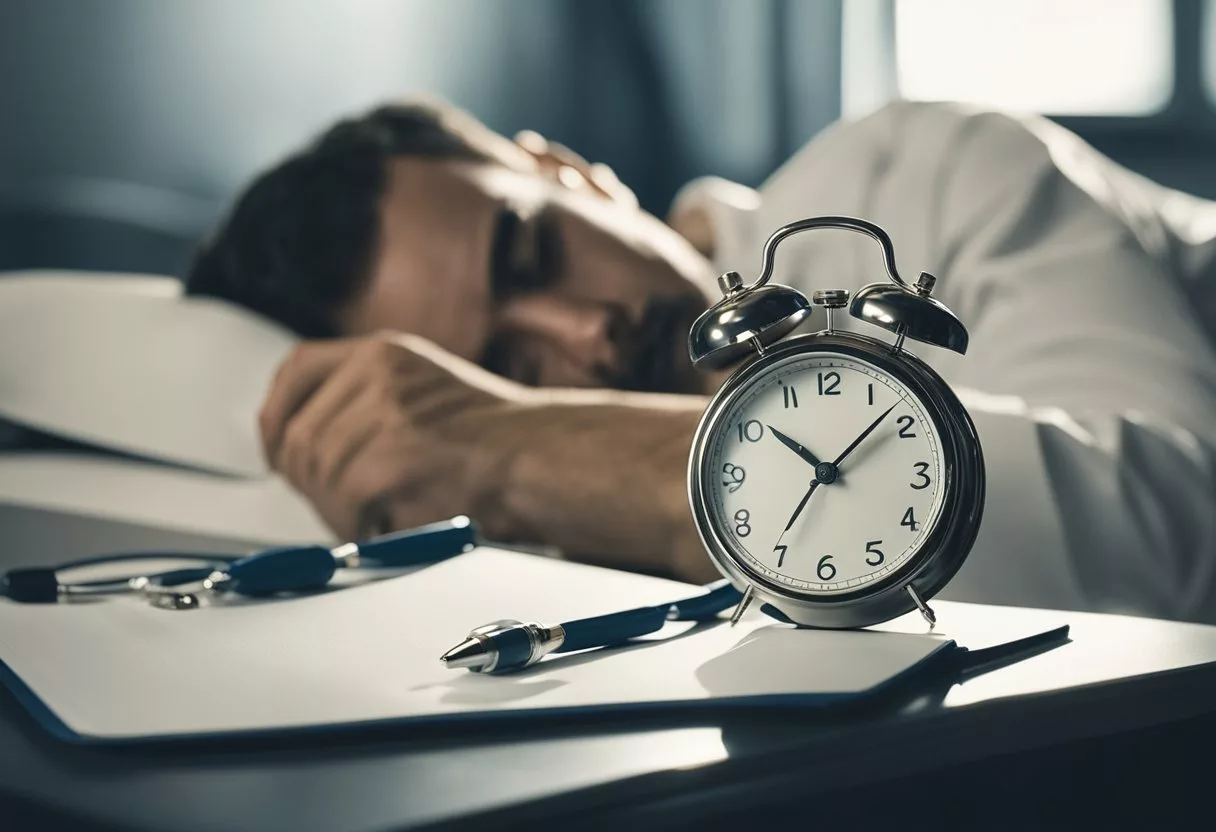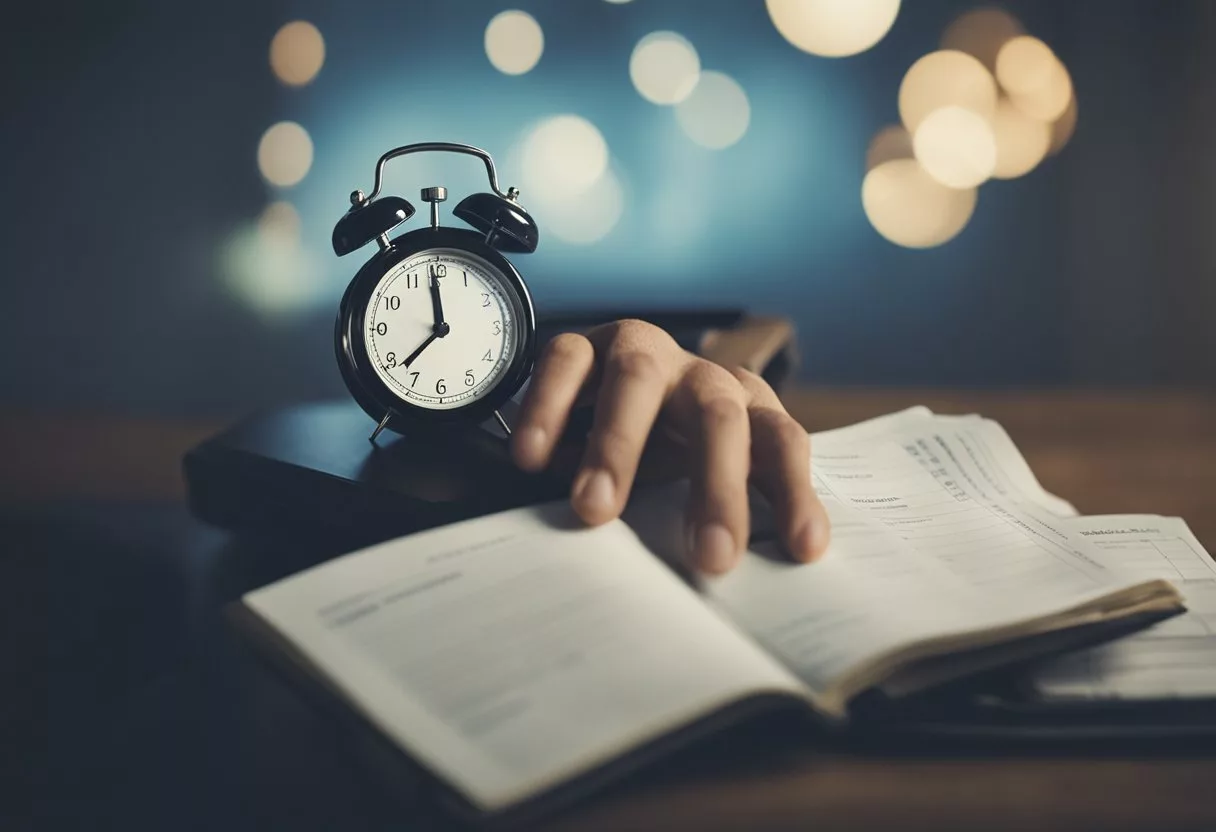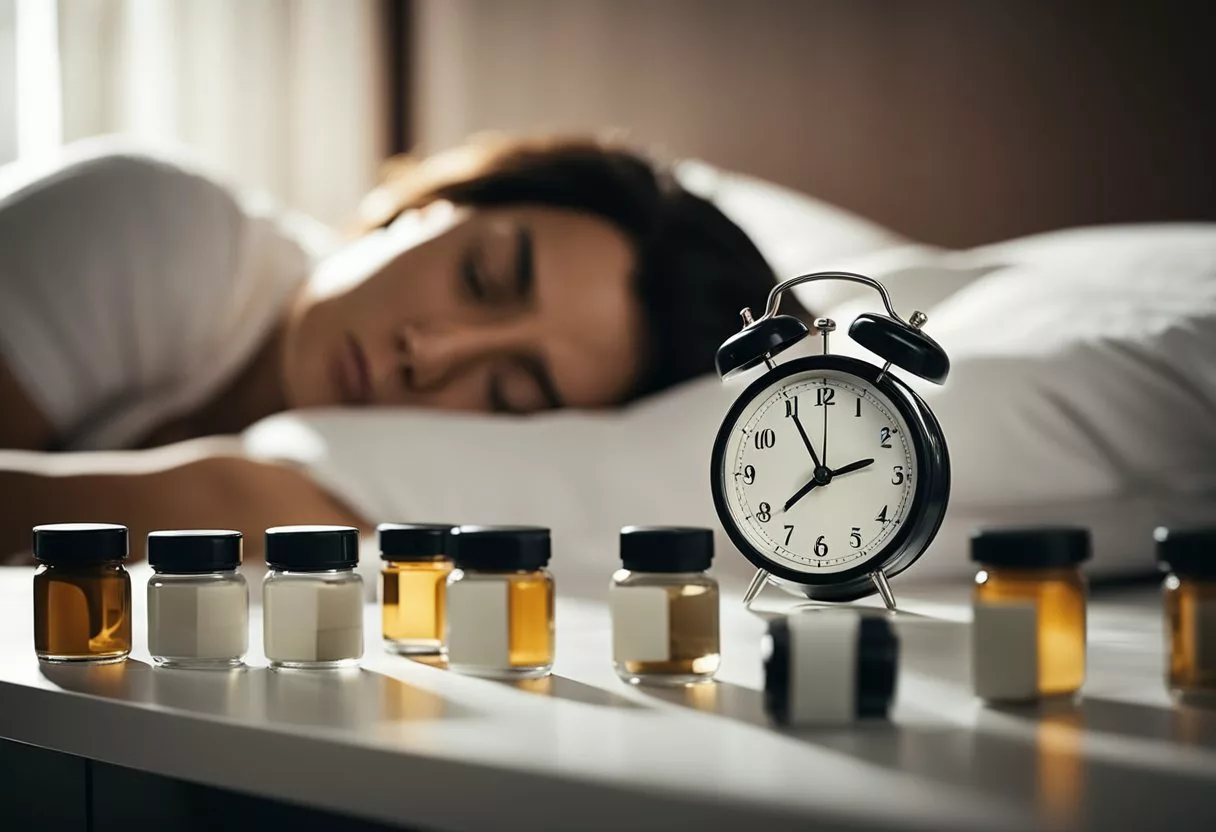Hypersomnia is a sleep disorder that makes people feel very sleepy during the day. It can be hard to stay awake even after sleeping a lot at night. This can cause problems at work, school, or while driving.
 [1]
[1]What to do before bed to sleep better:
Watch the video NOW![2]
Doctors diagnose hypersomnia by looking at symptoms and doing sleep tests. They check how long a person sleeps and how sleepy they are during the day. The doctor may also do other tests to rule out other health issues.
Treating hypersomnia aims to help people stay awake and alert. Doctors often prescribe stimulant medicines[3] like modafinil. These medicines can have side effects like headaches or nausea. Patients may also need to make changes to their sleep habits and daily routine.
Key Takeaways
- Hypersomnia causes extreme daytime sleepiness that can disrupt daily life
- Diagnosis involves sleep tests and ruling out other conditions
- Treatment includes stimulant medications and lifestyle changes
Understanding Hypersomnia

Hypersomnia is a sleep disorder characterized by excessive daytime sleepiness and prolonged nighttime sleep. It can significantly impact a person’s daily life, relationships, and overall well-being.
Defining Hypersomnia
Hypersomnia is a condition where a person experiences extreme sleepiness during the day[4], even after getting enough sleep at night. People with hypersomnia often sleep for long periods, sometimes 10 hours or more, yet still feel very tired during waking hours.
The disorder can be primary (occurring on its own) or secondary (caused by another condition). Primary hypersomnia includes idiopathic hypersomnia and narcolepsy. Secondary hypersomnia may result from medical conditions, medications, or substance use.
Hypersomnia differs from occasional sleepiness. It’s a chronic condition that persists for at least three months and isn’t relieved by naps or longer sleep periods.
Symptoms of Hypersomnia
The main symptom of hypersomnia is excessive daytime sleepiness. People with this condition may:
- Feel an overwhelming need to sleep during the day
- Take long, unrefreshing naps
- Have difficulty waking up in the morning
- Experience sleep inertia or “sleep drunkenness”
Other symptoms include:
- Irritability
- Anxiety
- Decreased alertness
- Memory problems
- Slow thinking or speech
These symptoms can lead to poor performance at work or school, relationship issues, and an increased risk of accidents.
Causes and Risk Factors
The exact cause of hypersomnia isn’t always clear. Some potential causes include:
- Brain injuries or tumors
- Neurological disorders
- Genetic factors
- Medications
- Substance use or withdrawal
Risk factors for hypersomnia include:
- Family history of the condition
- Certain medical conditions like hypothyroidism or depression
- Obesity
- Sleep disorders like sleep apnea
Lifestyle factors such as irregular sleep schedules or insufficient nighttime sleep can also contribute to hypersomnia-like symptoms.
Related Disorders
Several sleep disorders are closely related to hypersomnia:
- Narcolepsy: A neurological disorder causing sudden sleep attacks and excessive daytime sleepiness.
- Idiopathic Hypersomnia: Similar to narcolepsy but without sudden sleep attacks.
- Kleine-Levin Syndrome: A rare disorder characterized by recurring periods of excessive sleep.
- Sleep Apnea: Causes daytime sleepiness due to interrupted nighttime sleep.
- Insufficient Sleep Syndrome: Occurs when a person consistently doesn’t get enough sleep.
These disorders can have overlapping symptoms, making accurate diagnosis crucial for proper treatment.
Diagnostic Evaluation

Diagnosing hypersomnia involves a thorough assessment process. This includes initial patient evaluations, various tests, and specialized tools to measure sleep patterns and daytime sleepiness.
Initial Assessment
The first step in diagnosing hypersomnia is a detailed medical history[5]. A doctor will ask about sleep habits, daytime sleepiness, and any other symptoms. They may use the Epworth Sleepiness Scale to measure daytime sleepiness levels.
Patients are often asked to keep a sleep diary for several weeks. This helps track sleep patterns and daytime naps.
A physical exam checks for signs of other medical conditions that could cause sleepiness. The doctor will also review family history, as some sleep disorders can run in families.
A central nervous system exam may be done to check for neurological issues.
Laboratory and Imaging Tests
Blood tests can rule out medical conditions that cause excessive sleepiness. These may include thyroid function tests, complete blood count, and basic metabolic panel.
Imaging tests like MRI or CT scans of the brain may be ordered if a neurological cause is suspected.
In some cases, doctors might test orexin (hypocretin) levels in cerebrospinal fluid. Low levels can indicate narcolepsy, which has similar symptoms to hypersomnia.
Specialized Diagnostic Tools
Polysomnography[3] is a key test for diagnosing sleep disorders. It records brain waves, eye movements, heart rate, and other bodily functions during sleep.
The Multiple Sleep Latency Test (MSLT) measures how quickly a person falls asleep during the day. It’s often done the day after polysomnography.
Actigraphy uses a small device worn on the wrist to track sleep-wake cycles over several days or weeks.
These tests help doctors understand sleep patterns and rule out other sleep disorders like sleep apnea.
Criteria for Diagnosis
Doctors use the International Classification of Sleep Disorders to diagnose hypersomnia. The American Academy of Sleep Medicine provides clinical practice guidelines.
Key criteria include:
- Excessive daytime sleepiness for at least 3 months
- No other medical or psychiatric causes
- Normal nighttime sleep or long sleep time (more than 9 hours)
- No evidence of other sleep disorders
Symptoms must significantly impact daily life. The diagnosis is made after ruling out other possible causes of excessive sleepiness.
Treatment Strategies
Treating hypersomnia involves multiple approaches. These include changing daily habits, using medicines, and trying new therapies. Each method aims to reduce sleepiness and improve daily life.
Lifestyle and Behavioral Interventions
Good sleep habits[3] are key for managing hypersomnia. Setting a regular sleep schedule helps regulate the body’s internal clock. Going to bed and waking up at the same time each day is important.
Short daytime naps can help some people feel more alert. But it’s best to limit naps to 15-20 minutes. Longer naps may make nighttime sleep harder.
Avoiding alcohol and caffeine close to bedtime can improve sleep quality. Regular exercise during the day may also help, but not too close to bedtime.
Making the bedroom cool, dark, and quiet creates a good sleep environment. Using blackout curtains and white noise machines can help.
Pharmacological Treatments
Medications play a big role[6] in treating hypersomnia. Stimulants are often prescribed to increase alertness during the day.
Modafinil is a common choice. It helps people stay awake without the jitters of older stimulants. Methylphenidate is another option that can improve focus and energy.
For some types of hypersomnia, sodium oxybate may be used. It helps improve nighttime sleep quality and reduce daytime sleepiness.
Some doctors try other medicines like clarithromycin or benzodiazepines. These are used less often but may help in certain cases.
Emerging Therapies
New treatments for hypersomnia are being studied. Lower-sodium versions of oxybate show promise in clinical trials.
Researchers are looking at drugs that target different brain chemicals. These might offer new ways to fight sleepiness.
Some studies explore combining medicines for better results. This approach might help people who don’t respond well to single drugs.
Non-drug therapies[7] are also being tested. These include light therapy and new types of cognitive behavioral therapy tailored for hypersomnia.
Scientists are working on ways to better understand each person’s specific sleep issues. This could lead to more personalized treatment plans in the future.
Living with Hypersomnia

Hypersomnia impacts many aspects of daily life. People with this condition face challenges in work, social situations, and personal well-being. They often need to develop strategies to manage symptoms and seek support.
Managing Day-to-Day Life
People with hypersomnia experience extreme sleepiness during the day[4]. This can make simple tasks difficult. Many find it hard to stay awake while driving or working.
To cope, some people take planned naps. These can help reduce drowsiness. Others use caffeine or medication to stay alert.
Work can be challenging. Some people with hypersomnia talk to their employers about flexible hours or work-from-home options. This helps them manage their sleep needs better.
Driving safety is a big concern. Many avoid driving long distances or during times when they feel sleepiest.
Psychological and Emotional Effects
Hypersomnia can take a toll on mental health. Many people feel frustrated or sad about their condition. They might withdraw from social activities.
Depression and anxiety are common. The constant tiredness can make people feel hopeless or worried about their future.
Some experience changes in appetite or mood swings. These can be side effects of the condition or its treatments.
It’s important for people with hypersomnia to talk to a doctor about these feelings. Mental health support can be a key part of treatment.
Support Systems and Resources
Having a strong support system is crucial. Family and friends can help with daily tasks and provide emotional support.
Support groups connect people with similar experiences. They can share tips and feel less alone.
The American Academy of Sleep Medicine[6] offers resources and doctor referrals. The Genetic and Rare Diseases Information Center has info on rare forms of hypersomnia.
Online forums and social media groups can be helpful. They provide a space to share experiences and learn coping strategies.
Some people find comfort in educating others about hypersomnia. This can help reduce stigma and increase understanding.
Prognosis and Future Directions
The outlook for people with hypersomnia varies. New research and treatments offer hope for better management of this condition.
Outlook for Patients
Many people with hypersomnia[4] can lead normal lives with proper treatment. Medications like modafinil help patients stay awake during the day. Lifestyle changes also play a key role in managing symptoms.
Some patients may need to adjust their work or school schedules. Regular sleep habits and avoiding late nights are important. Exercise and a healthy diet can improve overall well-being.
Long-term management often requires ongoing care. Patients may need to try different treatments to find what works best. Regular follow-ups with sleep specialists help track progress and adjust treatment plans as needed.
Research and Innovations
Scientists are working to better understand hypersomnia. New studies focus on the causes and mechanisms of excessive sleepiness. This research may lead to more targeted treatments in the future.
Clinical trials[3] are testing new medications for hypersomnia. Some drugs aim to improve wakefulness without the side effects of current options. Others target the underlying brain chemistry linked to excessive sleepiness.
Researchers are also exploring non-drug treatments. These include light therapy and cognitive behavioral therapy for insomnia. Advanced brain imaging techniques may help identify subtypes of hypersomnia, leading to more personalized care.
Frequently Asked Questions
Hypersomnia can be tricky to diagnose and treat. People often have questions about symptoms, treatments, and how doctors make a diagnosis. Let’s address some common concerns about this sleep disorder.
What are the common symptoms that indicate I might have hypersomnia?
Excessive daytime sleepiness[4] is the main sign of hypersomnia. People may feel very tired during the day, even after sleeping for long periods at night.
Other symptoms include sleeping for more than 10 hours a night and still feeling sleepy. Some people have trouble waking up in the morning or after naps.
What standard treatments are available for hypersomnia?
Doctors often prescribe stimulant medications to help people with hypersomnia stay awake. These drugs can increase alertness during the day.
Some patients benefit from lifestyle changes. This might include setting a regular sleep schedule or avoiding alcohol and caffeine before bed.
Are there any effective home remedies for managing hypersomnia?
While not a cure, some people find relief with good sleep habits. This means going to bed and waking up at the same time each day.
Regular exercise and avoiding heavy meals before bedtime can also help. Some find that short, planned naps during the day improve their alertness.
How is hypersomnia formally diagnosed?
Doctors use several tools to diagnose hypersomnia. They may ask patients to keep a sleep diary[3] and fill out questionnaires about daytime sleepiness.
Sleep studies are often used. These tests measure brain activity, breathing, and other factors while a person sleeps.
What is the difference between primary hypersomnia and secondary hypersomnia?
Primary hypersomnia occurs on its own, without another medical condition causing it. This includes disorders like narcolepsy.
Secondary hypersomnia is caused by other health issues. These might include sleep apnea, depression, or certain medications.
Can certain sleep disorders lead to oversleeping?
Yes, some sleep disorders can cause oversleeping. Obstructive sleep apnea is one example. It disrupts nighttime sleep, leading to excessive daytime sleepiness.
Narcolepsy is another disorder that can cause oversleeping. People with narcolepsy may sleep for long periods but still feel tired during the day.
References
- Bizarre Salt Water Trick To Dissolve Belly Fat Fast. https://5ae58xkq1t8w3xfer7pk8n7yez.hop.clickbank.net?lid=1&tid=hypersomnia1 Accessed October 23, 2025
- Bizarre Salt Water Trick To Dissolve Belly Fat Fast. https://5ae58xkq1t8w3xfer7pk8n7yez.hop.clickbank.net?lid=1&tid=hypersomnia2 Accessed October 23, 2025
- Idiopathic hypersomnia - Diagnosis and treatment. https://www.mayoclinic.org/diseases-conditions/hypersomnia/diagnosis-treatment/drc-20362338 Accessed October 23, 2025
- Hypersomnia: What It Is, Causes, Symptoms & Treatment. https://my.clevelandclinic.org/health/diseases/21591-hypersomnia Accessed October 23, 2025
- Hypersomnia Tests and Diagnosis. https://www.sleepfoundation.org/hypersomnia/tests-and-diagnosis Accessed October 23, 2025
- Hypersomnia Treatments. https://www.sleepfoundation.org/hypersomnia/treatment Accessed October 23, 2025
- Treating people who have idiopathic hypersomnia or narcolepsy - including hypersomnia medicines, interactions with hormone medicines, and resources.... https://www.hypersomniafoundation.org/professionals/treatment/ Accessed October 23, 2025
